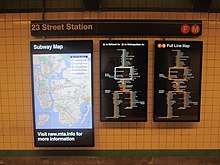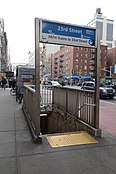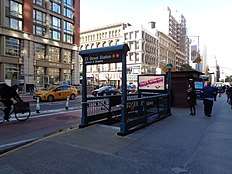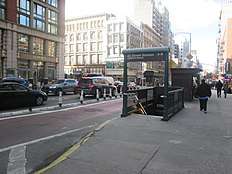23rd Street station (IND Sixth Avenue Line)
23rd Street is a local station on the IND Sixth Avenue Line of the New York City Subway. Located at the intersection of 23rd Street and Sixth Avenue (Avenue of the Americas) in Manhattan. It is served by the F train at all times, the M train during weekdays, and by the <F> train during rush hours in the peak direction. This station and 14th Street are the only two local stations on the Sixth Avenue Line.
23 Street | |||||||||||||
|---|---|---|---|---|---|---|---|---|---|---|---|---|---|
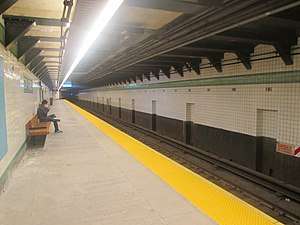 Downtown platform | |||||||||||||
| Station statistics | |||||||||||||
| Address | West 23rd Street & Sixth Avenue New York, NY 10011 | ||||||||||||
| Borough | Manhattan | ||||||||||||
| Locale | Chelsea, Flatiron District | ||||||||||||
| Coordinates | 40.742933°N 73.992877°W | ||||||||||||
| Division | B (IND) | ||||||||||||
| Line | IND Sixth Avenue Line | ||||||||||||
| Services | F M | ||||||||||||
| Transit connections | |||||||||||||
| Structure | Underground | ||||||||||||
| Platforms | 2 side platforms | ||||||||||||
| Tracks | 2 | ||||||||||||
| Other information | |||||||||||||
| Opened | December 15, 1940[1] | ||||||||||||
| Closed | July 23, 2018 (reconstruction) | ||||||||||||
| Rebuilt | November 29, 2018 | ||||||||||||
| Station code | 228[2] | ||||||||||||
| Wireless service | |||||||||||||
| Opposite-direction transfer available | No | ||||||||||||
| Traffic | |||||||||||||
| Passengers (2019) | 8,619,473[5] | ||||||||||||
| Rank | 36 out of 424[5] | ||||||||||||
| Station succession | |||||||||||||
| Next north | 34th Street–Herald Square: F | ||||||||||||
| Next south | 14th Street: F | ||||||||||||
| |||||||||||||
| |||||||||||||
| |||||||||||||
The 23rd Street station of the IND Sixth Avenue Line shares entrances with the 23rd Street station of the PATH, which is located in between this station's two platforms.
History
In 1924, the Independent Subway System (IND) submitted its list of proposed subway routes to the New York City Board of Transportation, which approved the program, which included the construction of the IND Sixth Avenue Line.[6] As part of the construction of the line, the Hudson and Manhattan Railroad's (now PATH) 23rd Street station had to be rebuilt to provide space for the Sixth Avenue Line's 23rd Street stop, which was to be built at the same level as the Hudson and Manhattan's stop.[7][8]
This station opened on December 15, 1940, as local subway service began on Sixth Avenue from the West Fourth Street subway station to the 47th–50th Streets station with track connections to the IND 53rd Street Line. The Sixth Avenue Line's construction cost $59.5 million.[1] Service was originally provided by the D, which ran between Norwood–205th Street and Hudson Terminal, and the F, which ran between Parsons Boulevard and Church Avenue.[9][10][11] This station replaced the 23rd Street station on the elevated IRT Sixth Avenue Line, which remained open while construction on the Sixth Avenue subway proceeded,[12][13] but closed in December 1938.[14]
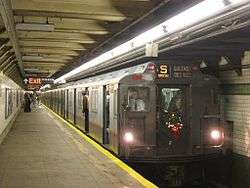
Ground was broken for two new express tracks between the West Fourth Street and 34th Street–Herald Square stations on April 19, 1961.[15] The express tracks were built 80 feet (24 m) beneath the surface. The construction was done in two portions. The first section was between West 9th and 19th Streets, and the second section was between West 19th and 31st Streets.[16] Although the express tracks, which went into service in 1967,[17] do not serve this station, provisions were incorporated into the design of the tunnel to permit the addition of a future lower level station here without disturbances to train operation.[18]
Under the 2015–2019 MTA Capital Plan, this station, along with 32 others, underwent a complete overhaul as part of the Enhanced Station Initiative. Updates included cellular service, Wi-Fi, USB charging stations, interactive service advisories and maps, improved signage, and improved station lighting.[19][20] In January 2018, the NYCT and Bus Committee recommended that Judlau Contracting receive the $125 million contract for the renovations of 57th and 23rd Streets on the IND Sixth Avenue Line; 28th Street on the IRT Lexington Avenue Line, and 34th Street–Penn Station on the IRT Broadway–Seventh Avenue Line and IND Eighth Avenue Line.[21] However, the MTA Board temporarily deferred the vote for these packages after city representatives refused to vote to award the contracts.[22][23] The contract was put back for a vote in February, where it was ultimately approved.[24] The subway station was closed for renovations on July 23, 2018,[25] and reopened slightly ahead of schedule on November 29, 2018.[26][27][28] Access to the PATH station was retained during the renovation via the street stairs on the southern side of the station, which are owned by the Port Authority; hence, those entrances were not renovated.[25]
Station layout
| G | Street level | Exit/entrance |
| B1 Sixth Avenue and PATH platforms |
West mezzanine | Fare control, MetroCard machines |
| Side platform | ||
| Northbound local | ← ← | |
| Side platform | ||
| Northbound | ← HOB–33 weekdays toward 33rd Street (Terminus) ← JSQ–33 (via HOB weekends) toward 33rd Street (Terminus) | |
| Southbound | HOB–33 weekdays toward Hoboken (14th Street) → JSQ–33 (via HOB weekends) toward Journal Square (14th Street) → | |
| Side platform | ||
| Southbound local | | |
| Side platform | ||
| East mezzanine | Fare control, station agent, MetroCard machines | |
| B2 | Underpass | Connection between PATH platforms |
| B3 Lower level[29] |
Northbound express | ← |
| Southbound express | | |
This underground station has two tracks and two side platforms.[30] No crossover, crossunder or mezzanine exists to allow a free transfer between directions. The PATH tracks, which were built 40 years before the Sixth Avenue Line, are behind the trackway walls where there would typically be the express tracks. The Sixth Avenue PATH tracks are on top of the express tracks, which were constructed in the mid-1960s using the "deep-bore" tunneling method and both are not visible from the station.[29] The tile band is lime green. The tile band on the track walls appears to be obscured by support beams directly underneath 23rd Street.
On the express tracks on the lower level, the deep-bore tunnel's round shape becomes square below this station and at 14th Street stations, where provisions for lower level platforms were built.
The 2018 artwork at this station is Stationary Figures by William Wegman. It is composed of 11 glass tile mosaics of Wegman's Weimaraners (a breed of dogs), each of which is wearing different attire.[31][28]
Exits
The northbound platform has exits on the east side of 23rd Street and Sixth Avenue, while the southbound platform has exits to the west side. Each side of the station has four street staircases on the corresponding side of Sixth Avenue, two to each corner.[32] The station also features direct indoor entrances to the 23rd Street PATH station on both sides; the northbound platform has a direct entrance to the 33rd Street-bound PATH, while the southbound platform has a direct entrance to the New Jersey-bound PATH.
The southern entrances on each side contain simple gray steel fences and are maintained by the Port Authority of New York and New Jersey, PATH's operator, rather than the Metropolitan Transportation Authority, the New York City Subway's operator. The southern entrances appear to be part of the original PATH station, which was built in 1911.[32] The northern entrances on each side contain green-metal fences that are standard to the New York City Subway, with countdown clocks showing the time until the next train arrives. One of the two entrances on each side contain black slabs with digital maps of the surrounding neighborhood, as well as a lighted green bar at the top of the slabs.
- Southeast corner entrance, seen in 2017
- Northeast corner entrance, seen in 2017
- Northeast corner entrance, seen in 2018 after 2015-2019 Capital Program renovation
References
- "New Subway Line on 6th Ave. Opens at Midnight Fete". The New York Times. December 15, 1940. p. 1. Retrieved October 7, 2011.
- "Station Developers' Information". Metropolitan Transportation Authority. Retrieved June 13, 2017.
- "NYC Subway Wireless – Active Stations". Transit Wireless Wifi. Retrieved November 13, 2019.
- Attached PDF to "Governor Cuomo Announces Wireless Service and New "Transit Wireless WiFi" in Queens and Manhattan Subway Stations", governor.ny.gov
- "Facts and Figures: Annual Subway Ridership 2014–2019". Metropolitan Transportation Authority. 2020. Retrieved May 26, 2020.
- "New Subway Routes in Hylan Program to Cost $186,046,000 – Board of Transportation Adopts 22.90 Miles of Additional Lines – Total Now $345,629,000 – But the Entire System Planned by Mayor Involves $700,000,000 – Description of Routes – Heaviest Expenditures Will Be Made on Tunnels – No Allowance for Equipment – New Subway Routes to Cost $186,046,000". The New York Times. March 21, 1925. ISSN 0362-4331. Retrieved April 8, 2018.
- "New Subway Line on 6th Ave. Opens at Midnight Fete". The New York Times. December 15, 1940. p. 1. Retrieved October 7, 2011.
- Harrington, John W. (May 5, 1935). "CITY PLANS ITS COSTLIEST SUBWAY; In a Short Two Miles Under Sixth Avenue the Engineers Will Encounter Many Intricate Problems". The New York Times. Retrieved April 28, 2018.
- "The New Subway Routes". The New York Times. December 15, 1940. ISSN 0362-4331. Retrieved April 15, 2018.
- "6th Ave. Tube Adds Two New Services – Provides Express Facilities to Queens and Local Trains to Washington Heights – Subway Opens on Dec. 15 – Changes in Routings on Other Lines to Bring Faster Time and Less Congestion". The New York Times. December 5, 1940. ISSN 0362-4331. Retrieved April 15, 2018.
- "New Subway to Add 2 Need Services – Opening of 6th Ave. Line to Provide Uptown Local Route and More Queens Expresses". The New York Times. December 2, 1939. ISSN 0362-4331. Retrieved April 15, 2018.
- "DELANEY FOR RAZING ELEVATED LINE NOW; Work in 6th Av. Could Begin in Six Months if Condemnation Started at Once, He Says. SEES CUT IN SUBWAY COST Eliminating Need for Underpinning Would Save $4,000,000 and Speed Construction, He Holds". The New York Times. January 11, 1930. Retrieved April 27, 2018.
- "ENDS MOVE TO SCRAP 6TH AVENUE ELEVATED; Transit Commission Explains No Interest Has Been Shown in Demolition Since January". The New York Times. September 17, 1931. Retrieved April 28, 2018.
- "GAY CROWDS ON LAST RIDE AS SIXTH AVE. ELEVATED ENDS 60-YEAR EXISTENCE; 350 POLICE ON DUTY But the Noisy Revelers Strip Cars in Hunt for Souvenirs SUIT MAY DELAY RAZING Little Threat Seen to Plan, However-Jobless Workers to Press Their Protest Makes Only One Stop Entrances Are Boarded Up FINAL TRAINS RUN ON ELEVATED LINE Police Guard Structure". The New York Times. December 5, 1938. ISSN 0362-4331. Retrieved April 26, 2018.
- Levey, Stanley (April 19, 1961). "Construction of New IND Tunnel For 6th Ave. Line Begins Today; Express Tracks Deep Under Street to Run From 4th to 34th St. -- 1964 Finish Set for $22,000,000 Job". The New York Times. ISSN 0362-4331. Retrieved April 28, 2018.
- Annual Report 1964–1965. New York City Transit Authority. 1965.
- Raskin, Joseph B. (2013). The Routes Not Taken: A Trip Through New York City's Unbuilt Subway System. New York, New York: Fordham University Press. doi:10.5422/fordham/9780823253692.001.0001. ISBN 978-0-82325-369-2.
- Annual Report 1962–1963. New York City Transit Authority. 1963.
- "MTA Will Completely Close 30 Subway Stations For Months-Long "Revamp"". Gothamist. Archived from the original on August 1, 2016. Retrieved July 18, 2016.
- "MTAStations" (PDF). governor.ny.gov. Government of the State of New York. Retrieved July 18, 2016.
- Metropolitan Transportation Authority (January 22, 2018). "NYCT/Bus Committee Meeting" (PDF). p. 135. Archived from the original (PDF) on January 27, 2018. Retrieved January 19, 2018.
- Barone, Vincent (January 24, 2018). "Controversial cosmetic subway improvement plan falters". am New York. Retrieved January 25, 2018.
- Siff, Andrew (January 24, 2018). "MTA Shelves Plan to Modernize Subway Stations Amid Criticism". NBC New York. Retrieved January 25, 2018.
- "Foes Hit Gov's Station Fix Plan". NY Daily News. February 13, 2018. Retrieved February 23, 2018.
- "Repairs and Improvements Coming to Three Manhattan 6FM Subway Stations". www.mta.info. Metropolitan Transportation Authority. June 15, 2018. Retrieved June 18, 2018.
- "Service Restored Trains stop at 23 St". mta.info. Metropolitan Transportation Authority. November 29, 2018. Archived from the original on November 29, 2018. Retrieved November 29, 2018.
- "Planned Service Changes for: Thursday, November 29, 2018". mta.info. Metropolitan Transportation Authority. November 29, 2018. Archived from the original on November 29, 2018. Retrieved November 29, 2018.
- Yakas, Ben (November 30, 2018). "Photos: The Newly Reopened 23rd Street F/M Station Has Already Gone To The Dogs". Gothamist. Archived from the original on December 1, 2018. Retrieved November 1, 2018.
- nycsubway.org – IND 6th Avenue: 23rd Street
- Dougherty, Peter (2006) [2002]. Tracks of the New York City Subway 2006 (3rd ed.). Dougherty. OCLC 49777633 – via Google Books.
- "Arts & Design - NYCT Permanent Art". MTA. Retrieved November 1, 2018.
- "MTA Neighborhood Maps: Chelsea" (PDF). mta.info. Metropolitan Transportation Authority. 2015. Retrieved December 11, 2015.
External links
| Wikimedia Commons has media related to 23rd Street (IND Sixth Avenue Line). |
- nycsubway.org – IND 6th Avenue: 23rd Street
- Station Reporter — F Train
- Station Reporter — M Train
- 23rd Street entrance from Google Maps Street View
- Platform from Google Maps Street View
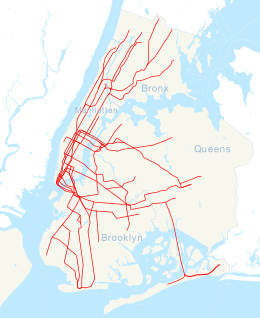


%26groups%3D_0626b84cfadd39f16439979be5495ad46e5e0def.svg)
